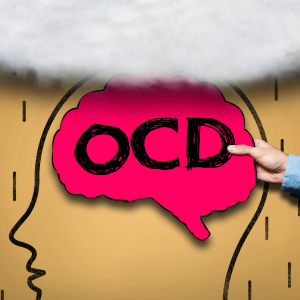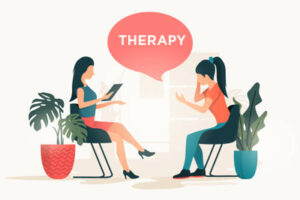Do you feel like OCD is ruling your life? If so, you’re not alone. OCD can be a very challenging disorder to overcome. However, with the help of Cognitive Behavioral Therapy (CBT), it is definitely possible! Cognitive-behavioral therapy is often considered to be the gold standard for the treatment of OCD, and it has been shown to be effective in many cases.
In this blog post, we will discuss how CBT can be used to conquer OCD. We’ll also provide some helpful tips for getting started. So if you’re ready to take back control of your life, keep reading!
Contents
OCD: Meaning And Symptoms
Obsessive-compulsive disorder is an anxiety disorder characterized by intrusive thoughts (obsessions) and repetitive behaviors (compulsions).
For example, someone with OCD may have intrusive thoughts about germs and contamination. In order to ease their anxiety, they may wash their hands excessively or avoid touching door handles.
Symptoms of OCD include:
- Excessive hand-washing or cleaning
- Checking things repeatedly
- Arranging things in a certain order
- Avoiding situations or objects that may trigger obsessions
- Repeating certain actions or words over and over again
- Having intrusive, unwanted, and distressing thoughts
- Engaging in compulsive behaviors to try to relieve anxiety caused by the obsessions.
Why Is The Treatment For OCD Necessary? 
There are a number of reasons why treatment for OCD is necessary.
- First, the symptoms of OCD can be extremely debilitating. They can interfere with work, school, and personal relationships.
- Second, the symptoms of OCD can cause a great deal of distress. This distress can lead to anxiety, depression, and even suicide.
- Third, the symptoms of OCD can be very difficult to manage on one’s own.
- Fourth, there is no known cure for OCD. However, there are effective treatments that can help lessen the symptoms and improve the quality of life for those who suffer from this disorder.
- Fifth, without treatment, the symptoms of OCD tend to worsen over time.
- lastly, untreated OCD can lead to serious consequences, such as job loss, financial problems, and social isolation.
What Is CBT? 
Cognitive-behavioral therapy (CBT) is a type of psychotherapy that helps people change their negative thoughts and behaviors. It is based on the idea that our thoughts, feelings, and behaviors are all interconnected.
For example, someone with OCD may have the thought, “I might get sick if I don’t wash my hands.” This can lead to the feeling of anxiety, which can then lead to the behavior of excessive hand-washing. CBT aims to help people break this cycle by teaching them how to challenge their negative thoughts and engage in healthy behaviors.
What Are The Different Types?
There are several different types of CBT that can be used to treat OCD.
Exposure And Response Prevention 
ERP is a type of CBT that involves gradual exposure to the things that trigger your OCD symptoms, without engaging in the compulsive behaviors that you typically use to relieve anxiety.
This could involve coming into contact with real-life situations, thoughts, or objects that make you anxious. For example, if you are afraid of germs and contamination, your therapist may have you touch doorknobs or shake hands with someone after first washing your hands thoroughly.
The goal of exposure is to help you see that your feared consequences are not as likely to happen as you think they are. With repeated exposure, you will hopefully start to feel less anxious and your OCD symptoms will lessen.
Cognitive Restructuring
It is another type of CBT that can be used to treat OCD. Cognitive restructuring involves learning to identify and challenge distorted or unhelpful thoughts, beliefs, and assumptions.
For example, someone with OCD might have the thought “I could get sick if I don’t wash my hands.” The cognitive restructuring would involve challenging this thought by looking at the evidence for and against it. In this case, the person might realize that there is no evidence that they will actually get sick if they don’t wash their hands. Cognitive restructuring can be a helpful tool for managing OCD symptoms.
Acceptance And Commitment Therapy
There are many different types of cognitive-behavioral therapy (CBT), but one that has shown particular promise in the treatment of OCD is called acceptance and commitment therapy. ACT is a form of CBT that focuses on helping people to accept their thoughts and feelings, rather than trying to change or eliminate them.
For example, someone with OCD might have the thought “I am going to die if I don’t wash my hands right now”. ACT would help this person to understand that this is just a thought, and that thoughts are not reality. This can be a very powerful way to help people with OCD, as it can help them to see their thoughts for what they really are.
Another key component of ACT is helping people to focus on their values, and to take action in line with these values. For example, someone with OCD might have the value of “I want to be a good parent”. However, their OCD might mean that they spend so much time washing their hands that they never get to spend any time with their children. In this case, ACT would help the person to focus on their value of being a good parent, and to take action accordingly – in this case, spending less time washing their hands and more time with their children.
Thus, CBT has been shown to be an effective treatment for OCD, but it’s not the only option. Some people may also benefit from medication, self-help strategies, or other types of therapy.
What Is A CBT Session Look Like? 
CBT sessions typically last around 60 minutes. During the first session, the therapist will usually ask about your symptoms and how they affect your life.
The therapist will also ask about your thoughts, feelings, and behaviors related to OCD. This information will help the therapist create a treatment plan that is tailored to your needs. In subsequent sessions, you will learn skills to help you manage your OCD symptoms. The number of sessions needed will vary from person to person, but most people see a decrease in their OCD symptoms after around 12 sessions.
For example, you may learn how to expose yourself to situations that trigger your OCD. You may also learn relaxation techniques to help you manage your anxiety. Or, if you are afraid of germs, you may be asked to touch a doorknob or shake hands with someone. This is so that you can see that your fear is not based on reality and that you can control your anxiety. You may also be asked to do “exposure” tasks at home, such as not washing your hands for a period of time or touching objects that you normally avoid.
These tasks can be very difficult, but they are an important part of treatment. CBT has been shown to be effective in treating OCD. It can help you to reduce your symptoms and live a more normal life. If you are considering CBT for OCD, talk to your doctor or mental health professional about whether it is right for you.
What Questions Can You Ask?
It’s important to interview them to make sure they’re a good fit for you. Here are some questions you might want to ask:
- What is your experience treating OCD?
- What is your success rate with treating OCD?
- Do you use exposure and response prevention (ERP)?
- What will therapy involve?
- How long will it take to see results?
- What are your fees?
- Do you accept insurance?
What Are The Benefits?

CBT has been shown to be an effective treatment for OCD as there are many benefits such as:
- CBT helps people learn new skills and strategies to manage their OCD symptoms.
- CBT helps people learn to challenge and change their negative thoughts and beliefs about themselves, their world, and other people. People with OCD often have very rigid ideas about what is “safe” or “dangerous,” “clean” or “contaminated,” and so on. CBT helps people to question these rigid beliefs and to see that their thoughts are just thoughts, not reality.
- CBT also teaches people how to control and reduce their compulsions. People with OCD often feel the need to perform certain rituals or behaviors (such as hand-washing, checking, or ordering) in order to relieve their anxiety. However, these rituals only provide temporary relief, and actually make the OCD worse in the long run. CBT helps people to understand this cycle of obsessions and compulsions and teaches them how to break it by slowly reducing their rituals.
Thus, CBT can help reduce OCD symptoms and improve quality of life.
What Are The Limitations?
CBT for OCD has been found to be effective in treating the symptoms of OCD, but there are some limitations to this approach.
- One limitation is that CBT requires a lot of time and effort from both the therapist and the patient. This can be difficult to maintain over the long term.

- Additionally, CBT may not be effective for everyone with OCD. Some people may require medication or other forms of treatment in addition to CBT.
- Finally, even though CBT can be effective in reducing OCD symptoms, it does not cure OCD. The symptoms may return if the person stops attending therapy sessions or if they do not continue to practice the skills they have learned in therapy.
Despite these limitations, CBT is still considered an effective treatment option for OCD. If you are considering CBT for OCD, be sure to consult with a mental health professional to see if it is the right treatment for you.
Conclusion
At the end of this article, it is concluded that cbt for OCD is an effective treatment for individuals who suffer from this mental illness. If you or a loved one are struggling with OCD, consider seeking out a qualified therapist who can help you develop healthy coping mechanisms and start living a happier life.
Never delay your mental health treatment. If you think you may be suffering from OCD, please reach out to a mental health professional today. It may take a little bit of time and effort, but cbt for OCD can be an extremely successful treatment for those who are willing to put in the work. Live your life free from the chains of OCD. You deserve it.
The first step on your road to healing is to get assistance from a professional. You may go online and use Therapy Mantra to locate expert help in the privacy of your own home. Our specialists will assist you in resolving and overcoming your issue. You can schedule an online therapy session and talk directly with your assigned mentor through our free OCD treatment app on Android or iOS.









